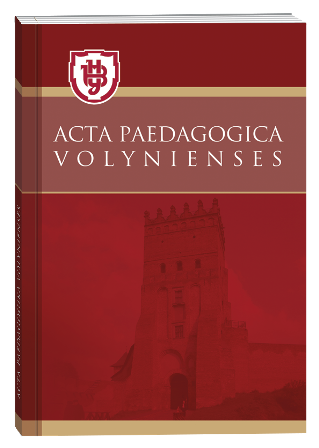FEATURES OF THE ACQUISITION OF GENDER CONCEPTS BY PRESCHOOL CHILDREN
DOI:
https://doi.org/10.32782/apv/2024.4.6Keywords:
gender, sex, gender education, preschoolers’ gender concepts, gender identity.Abstract
The article explores the possibilities of gender education for children, outlines its specific features at different age stages of preschool childhood, and emphasizes the importance of timely acquisition of sex-role knowledge for successful gender identity formation. It is emphasized that the upbringing of boys and girls, the acquisition of gender concepts and typical manners, occurs sequentially: sex-role identification; gender constancy; differential imitation; gender self-regulation. It has been proven that the presence of elementary gender knowledge allows a child to better understand themselves and others; positively influences the development of the cognitive, affective, and regulatory spheres of personality and the formation of a selfworth attitude. It has been determined that the essence of gender education for preschoolers lies in justifying the natural differences in the social behavior of men and women and demonstrating to adults the advantages of various gender roles. Factors influencing a child’s sex-role identification include: name; differences in clothing; language acquisition, including the use of appropriate pronouns and cases; games (especially role-playing games); and the attitudes and behaviors of parents towards the child as a member of a particular gender. It is emphasized that a preschool teacher should be aware of the stages of a child’s psychological, physical, and psychosexual development. This knowledge enables the teacher to observe, understand, and provide timely information about gender and sexual behavior. The teacher’s task is to facilitate the child’s correct understanding of the essence of socio-moral norms in gender relations and to cultivate the need to be guided by these norms in all spheres of life. It is important to combine sexrole perceptions with ethical rules and to focus on developing the morality of children of both sexes.
References
Базовий компонент дошкільної освіти (Державний стандарт дошкільної освіти): нова редакція. Наказ МОН України № 33. від 12.01.2021. URL: https://mon.gov.ua/ua/osvita/doshkilna-osvita/bazovij-komponent-doshkilnoyiosviti-v-ukrayini
Говорун Т., Кікінеджі О. Гендерна психологія: навч. посіб. Київ: ВЦ «Академія», 2004. 308 с.
Дорошенко З. Проблеми життєтворчості: статево-рольова самоідентифікація особистості дошкільника. Дошкільна освіта. 2007. № 4. С. 4–20.
Коваленко Е. Психологічні особливості статевої ідентифікації дошкільників. Scientific Collection «InterConf+», 2024. № 41 (185). С. 214–218. URL: https://doi.org/10.51582/interconf.19-20.01.2024.022
Кравець В. Гендерна педагогіка: навч. посіб. Тернопіль: Джура, 2003. 416 с.
Лебідь І. Гендерна педагогіка: навч.-метод. посіб. Кам’янець-Подільський: ТОВ «Друкарня «Рута», 2015. 130 с.
Очкур В. Гендерна стратегія виховання та гендерний підхід у розвитку дітей дошкільного віку. Дошкільний навчальний заклад. 2012. № 4. С. 2–14.
Павелків Р., Цигипало О. Дитяча психологія: навч. посіб. Київ : Академвидав, 2008. 432 с.
Савченко Ю. Особливості формування статево-рольових уявлень у старших дошкільників. Молодий вчений. 2017. № 10.2. С. 94–97. URL: http://molodyvcheny.in.ua/files/journal/2017/10.2/21.pdf
Сьоміна А., Куксенко О., Гормаш В. Гендерне виховання дітей дошкільного віку. Вихователь-методист дошкільного закладу. 2011. № 4. С. 36–50.
Цокур О., Іванова І. Гендерне виховання – нагальна потреба сучасної освітньої системи. Директор школи. Україна. 2006. № 6. С. 6–13.
Яшник С. Гендерний підхід у виховання: методичні рекомендації. Київ: НАУ, 2008. 32 с.







